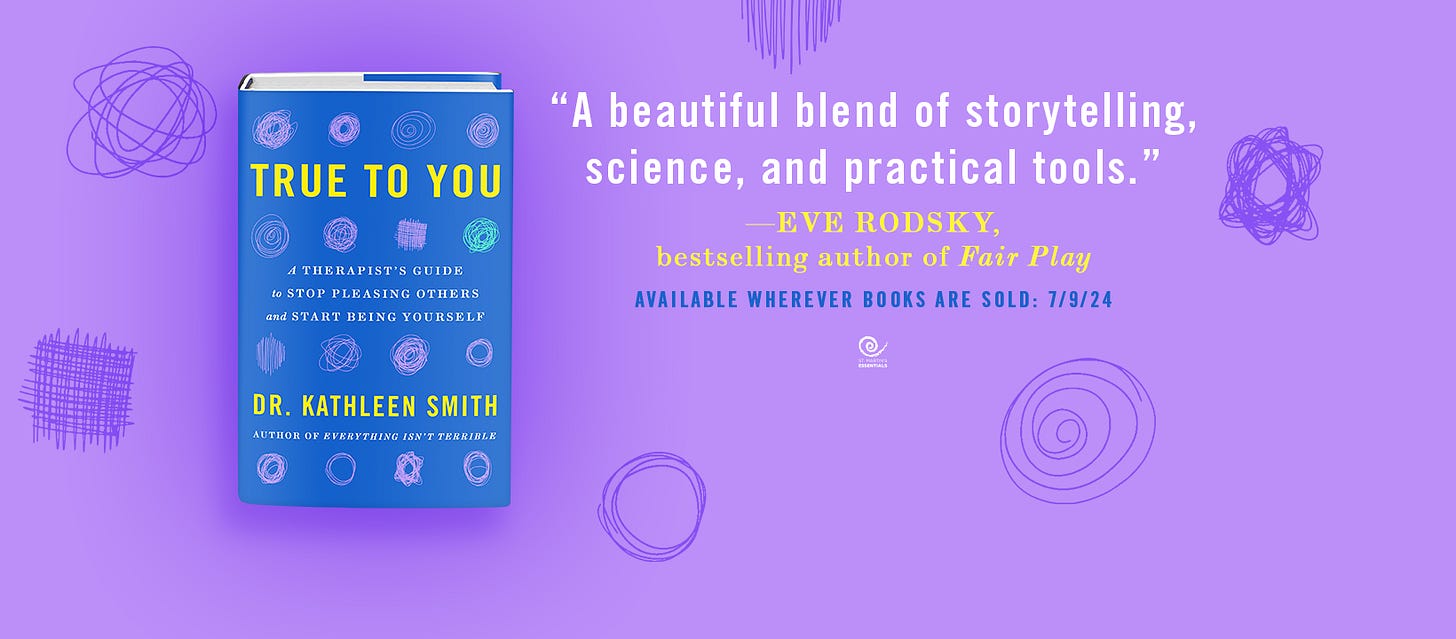Happy September! The morning air is cooler, Season 4 of Slow Horses is out, and I’m thoroughly enjoying annoying all the adults in my life by asking what their “back to school” goals are. This week I had the honor of getting to answer some questions about overfunctioning and people-pleasing for on her wonderful Substack on parenting. So head over there if you’re interested in some more words from me this week.
How has your help kept people stuck?
In Chapter 7 of True to You, I tell the story of Dave, Cindy, and Lucas. Cindy takes her husband Dave to therapy because she is tired of his constant overfunctioning for their adult son, Lucas.
This is one of the most common family stories there is. People tend to see problems in an individual, or a tense twosome, when the reality is a very active triangle. This is because it usually takes at least three people to keep things calm in an anxious system.
When people start thinking in triangles, they begin to see how their help isn’t always helpful. Their efforts may water down the intensity of relationship challenges, just enough that the pattern keeps chugging along. By suggesting (or demanding) that people change, we often fuel the very behaviors we find troublesome.
How has your “help” calmed an anxious twosome down just enough that it stays stuck?
This could look like:
Always mediating arguments between your spouse and kid.
Keeping the peace between your siblings.
Getting over-involved with how someone parents or grandparents.
Holding a meeting about how to make two colleagues get along.
Recruiting a therapist to teach a family or partner how to behave.
Coaching someone through problems in their love life.
Speaking for people in an organization when they’re nervous or unclear.
Delivering messages for a leader who won’t deliver them.
Updating family members about each other.
Getting over-involved with how your child makes friends.
There is an idea in Bowen theory that things can begin to change if a person:
Can remain in contact with each person in the tense twosome.
Not get over-involved with how they relate.
To be present, but no longer tidying up the anxiety that spills over. Because this is where the fun happens. Where people learn to dance.
Maybe things will get better, maybe they won’t. It depends on how you define better. Is “better” having everything calm down temporarily, or is it people gaining more capability? Is better the boost you get from playing the expert or the fixer, or is better the flexibility that the relationship system gains when people start to think through their challenges?
If the goal is the latter, you’ll have to sit with the discomfort of not being the mediator-in-chief.
I’m not saying that there’s never a place for involvement. Simply that most of the time, most of our interventions are more about managing the anxiety we feel than actually being a resource to people. There’s no curiosity in what’s very automatic for many people. No consideration that there’s more than one way for things to get better.
Think about key people in your family, your workplace, or other important groups.
Whose capabilities have you kept watered down through your own over-involvement?
Where have you appeared more mature (and gotten a boost in your own functioning) because two people couldn’t get along?
Where are you willing to tolerate some distress (and stay in contact with people) while people navigate relationship challenges?
When we let people be responsible for themselves, we add a great deal of flavor to our relationships. Don’t sell people short because you’re unable to tolerate the anxiety that comes with somebody learning to function up.
Want to learn more about systems thinking? Read my old post, “A Different Way to Think About Your Family’s Dysfunction.”
News from Kathleen
Buy my new book, True to You! (If you didn’t get the preorder bonus workbook, just reply to this email letting me know where you bought the book, and I’m happy to email you one.) And if you read it, please consider giving it a review online! Those stars help others find it.
Want to read more of my writing? Read my books or my newsletter archives.
Email me if you want me to speak to your group or are interested in working with me. Follow me on Linkedin, Facebook, or Instagram.
Want to learn more about Bowen theory? Visit the Bowen Center’s website to learn more about their conferences and training programs.






Major food for thought! Thank you!
Hi, Your point is well taken! Obviously, I don't know the whole story but isn't she taking care of the adult son just like Dad is - in her own way?